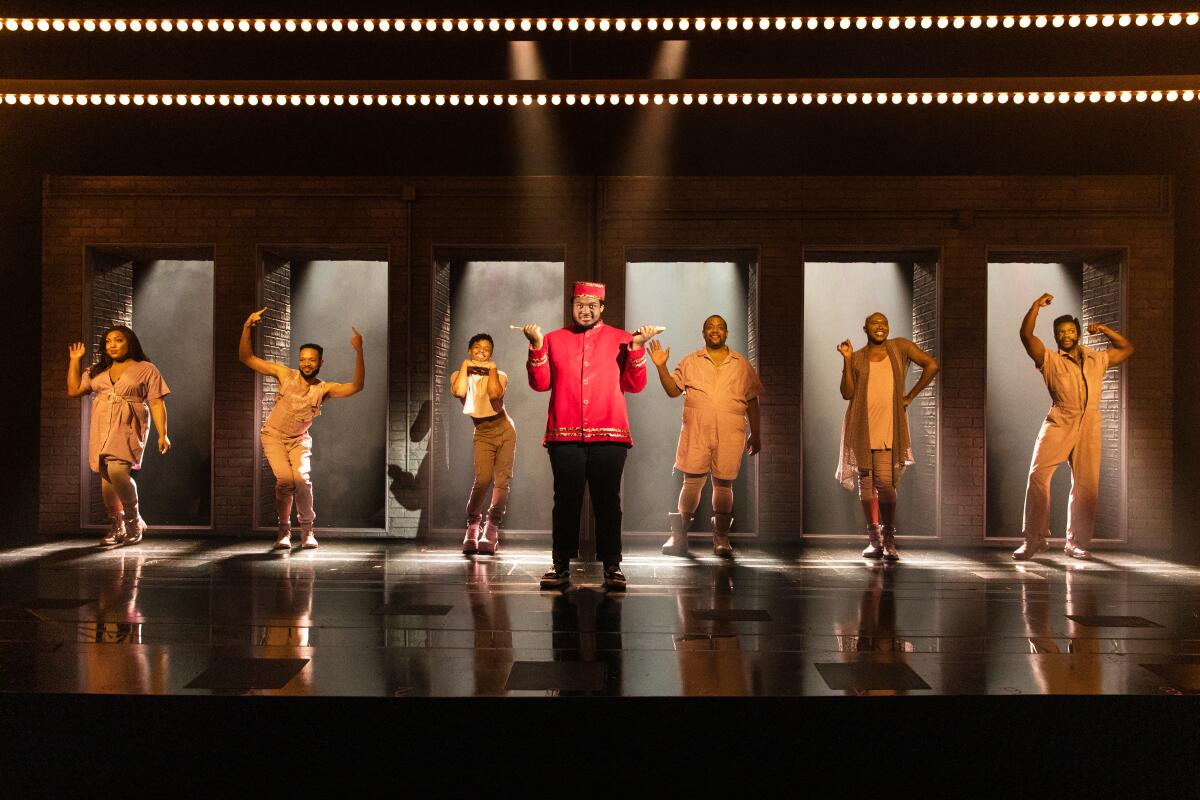The biggest entertainment stories
Get our big stories about Hollywood, film, television, music, arts, culture and more right in your inbox as soon as they publish.
You may occasionally receive promotional content from the Los Angeles Times.

Before dedicating himself to musical theater, playwright and composer Michael R. Jackson had a different dream: to be a soap opera writer.
“I thought I was going to work my way up and become the head writer for ‘One Life to Live’,” he said, speaking at a swanky new hotel’s rooftop cafe in downtown L.A. “That was my ambition when I was an 18-year-old.”
The soap opera bug never completely left him. Not even after the astounding success he had with “A Strange Loop,” his Pulitzer Prize- and Tony-winning musical that opens at the Ahmanson Theatre on Friday.
“White Girl in Danger,” his satirical musical that had its premiere last year off-Broadway, follows the machinations of the entitled inhabitants of Allwhite, a fictional town that behaves like a village in a daytime serial under the scrutiny of a sociologist with a wicked sense of humor. Critics were sniffy, but Jackson said he stands “100% behind it” and would love another crack.
Jackson’s most recent musical, “Teeth,” which had its premiere this year at Playwrights Horizons, where “A Strange Loop” was launched, is an adaptation of Mitchell Lichtenstein’s screenplay for his 2007 cult horror film. Jackson wrote the lyrics and co-wrote the book with Anna K. Jacobs, who composed the music. Reviews were mixed, but tickets were hard to come by for a musical that drew a noticeably younger and more vocally exuberant demographic than usual.
Jackson isn’t writing musicals of yesteryear. An artist defiantly of the present, he’s not especially susceptible to the lures of nostalgia. But art-house obscurity isn’t his goal either. Entertainment matters to him. So too does pop culture, which in addition to being a showcase for a society’s deepest fears and desires, has the added advantage of being rollicking good fun.

“A Strange Loop” is a wildly self-referential, giddily profane meta-musical about a struggling Black queer musical theater writer trying to create a musical that is faithful to his lived marginalized reality without being consigned to the theatrical margins. Usher, the show’s protagonist, sums up Jackson’s credo in the song “Tyler Perry Writes Real Life” when he sings, “I’m into entertainment/That’s undercover art.”
Adam Greenfield, artistic director of Playwrights Horizons, pointed to these lyrics as crucial to understanding Jackson as an artist. “Michael grew up on pop culture, soap operas, listening to popular music,” he said, in an interview at his New York office. “He’s read everything. But I think the way his brain processes complicated ideas and expresses them is through this filter of pop culture. When he has people’s attention, he’s got this dual instinct. He wants to shake foundations, but he also wants to entertain them.”
Jackson said that he’s been pondering how musicals fit into the art versus entertainment debate since a grad seminar at NYU complicated for him the distinction between high and low art. “Musical theater is rooted in a kind of entertainment, but over time artists came along and sort of revolutionized this primitive form and made it into something that maybe had a higher artistic value,” he said. “But what does this mean for the industry of theater?”
In “A Strange Loop,” he confronts the issue head-on by focusing on a musical theater writer who’s trying to create a show that reflects his own unsentimental reality. But can he pull this off and still command broad appeal? Or must he sell out for solvency’s sake and take a job with Tyler Perry, as his agent and parents, along with the ancestors inside his head, are clamoring for him to do?
This fundamental dilemma of the American musical — the battle between artistic integrity and commercial viability — finally gets a brilliant queer musical of its own.
“I was always taught that plays are a reflection of life,” he said. “And so I want to do that, but I also love the vaudevillian nature of musical theater. So those two things for me had to go together. My mission statement is to make things that are as challenging as they are accessible.”
Greenfield called Jackson an “iconoclast,” and this contrarian spirit is integral to an artist who is dubious of sacred cows. Jackson is part of a long tradition of dissenting, critical-minded dramatists, dating back to Euripides and extending through George Bernard Shaw to the present. But the take-no-prisoner nature of his satire has an unmistakable 21st century edge.
A warning to Ahmanson traditionalists: “A Strange Loop” may shock you with its whirling subversiveness. The musical builds to a showstopper that is meant to create maximum cognitive dissonance. “AIDS Is God’s Punishment” is the 11 o’clock number of the gospel show Usher perversely imagines he would write if, caving into pressure, he hopped on the Tyler Perry bandwagon.
“Ironic” is Jackson’s unapologetic description for a song that lures an audience into a religious fervor for a sacrilegious sentiment. The music invites us to sway as the lyrics knock our knees out from under us. “I’m a writer, and satire and irony are literary tools that I use a lot,” he said matter-of-factly.
“A Strange Loop” takes us inside Usher’s conflicted self through an ensemble that portrays his inner voices. These punishing, skeptical, prodding, guilt-inducing thoughts, personified with lampooning gusto, serve as the chattering chorus for his divided identity.
It’s no secret that Usher and Jackson have quite a bit in common, though the author insists that this is not an autobiographical musical. “Usher’s story is different from mine in a lot of ways, but I drew from my experience to capture a feeling,” he said.
Jackson, who hails from Detroit, arrived in New York to study dramatic writing as an undergraduate at NYU. He then went on to pursue a graduate degree in NYU’s musical theater writing program, specializing in book and lyric writing. Although he had done some child acting, Jackson said it was in college when he really fell in love with theater.
“I had no aspirations to be a composer, though I was very musically inclined,” he said. “I didn’t study composition formally, but I loved music. I sang in choirs and took piano lessons growing up.”
Success didn’t happen overnight. “A Strange Loop” had a long and uncertain gestation. By the time the musical had its premiere in 2019, Jackson was approaching 40.
“My life was just sort of writing, writing, writing, writing, writing, working in any job I could get to keep a roof over my head,” he said. “I often tell students, when I’m talking to them about my career, that I was at a weird point where it probably would have made more sense economically for me to move back home. But I was so broke, I couldn’t afford to move back. So I had to stay in New York and figure out a life for myself. And, fortunately, that life was just continuing to pound the pavement to get my work out there. That’s what I did for 15 years before the production happened at Playwrights Horizons.”
Like Usher, Jackson worked for a time as a Broadway usher. “I started at the New Amsterdam Theatre, when the ‘Lion King’ was there. And then that show moved out and ‘Mary Poppins’ came in. I was there for like a year. And then I got fired. I mean, it wasn’t like I was officially fired. It was more like I wasn’t asked back after a period when I was gone. I didn’t particularly enjoy doing that work, but that was one of the many jobs that I had in the lead up to ‘A Strange Loop.’ ”
Did he expect the show to explode the way it did? “Not even a little bit,” he said. “Because I had ushered for so long and saw Broadway up close, I was like, ‘There’s no way anything I do is going to get anywhere near any of this.’ And so, I was like, that just means I can do whatever I want. And that’s really what I did for years.”

Liberated from marketplace pressures, he worked on “A Strange Loop” in a bubble with his collaborators, crucially among them director Stephen Brackett. When the producing landscape started to shift and Jackson was invited into rooms where decisions happen, he still kept his dreams within certain bounds.
“I just thought the highest ceiling I could hit was maybe a nice off-Broadway production,” he said. “And so when I got Playwrights Horizons, which is one of my favorite off-Broadway theaters, where so many of my heroes had passed through, like Sondheim with ‘Sunday in the Park With George’ and Bill Finn with ‘Falsettos,’ I thought, ‘Oh, I hit the jackpot. That’s my ceiling. I can die now.’ And that’s all I ever really aspired to until the show was received in the way that it was. And then my producer approached me to ask if I wanted to try for Broadway.”
The 2020 Pulitzer Prize came as a complete surprise. He was on the phone with playwright Branden Jacobs-Jenkins, who was discreetly keeping tabs on the announcement, when the news broke.
“Branden has been such a good friend to me,” Jackson said. “He’s one of my few theater friends that I really trust and talk to. But I wasn’t tracking the Pulitzer. It never even dawned on me that musicals won because it doesn’t happen often. It’s similar to the way I just thought this show would never go to Broadway.”
The Pulitzer news came during the dark days of the pandemic. “At that time, all I was thinking about was COVID,” he said. “And the fact I was never going to have a career again. I just thought theater was over. I thought the world was over. And so hearing that I had won a Pulitzer Prize was like a weird sort of bucket of water on my head. It was a nice moment of feeling excited about something from the old world. We celebrated over Zoom, and I went for a walk and listened to some music to sort of feel like I was doing something to celebrate.”
The 2022 Tony Awards were a more festive occasion. “A Strange Loop” won for best book and best musical. The validation from his peers was especially meaningful to him, he said, given the humble origins of the piece.
“I wish everybody could have that moment of people cheering you on in that way,” he said, referring to when his name was called for best book. “And then when we won for best musical, that was even greater because it really acknowledges everybody.”
Jackson is too clear-eyed about the precarious state of theater and the even more perilous state of the world to rest on his laurels. “I think that there are a lot of people who respect my work,” he said. “But it has only become harder and harder for this work to be done. I hope that that doesn’t become my epitaph. But I feel a little discouraged because the economics are squeezing out the art, making it harder for artists to do daring things.”
As is his wont, Jackson looked to a song to articulate his thoughts: “I’m a huge Joni Mitchell fan,” he said. “And I’m constantly referencing her 1985 ‘Dog Eat Dog’ album and that song in particular, where she says, ‘Land of snap decisions/Land of short attention spans/Nothing is savored/Long enough to really understand.’”
These lines, he said, have never resonated more. “As an artist who’s trying to use his work to say things that don’t necessarily fit in one category or another, I find it quite difficult in this economic, cultural and political climate, because people want things to be one thing or the other. They don’t want to sit in ambiguity. They don’t want to consider ideas that might make them uncomfortable, or that might not align with their politics. Or they assume that whatever a writer writes represents what they think politically or culturally and that’s not necessarily true. And I feel like there used to be a time when we could sit in ambiguity a little bit more.”
Jackson has some choice words for those who foisted the current version of the internet down our throats: “I’m angry at all of the tech billionaires who did this to us. We consented. Now there are people who have decided they prefer living online all the time. And everything about their world is oriented around this,” he said, pointing contemptuously to his phone.
After venting his frustration at the faux community of social media and the way virtue signaling has been conflated with grassroots activism, he invoked lyrics from the Smashing Pumpkins to express the double bind of our technologically filtered reality: “Despite all my rage, I am still just a rat in a cage.”
Where does Jackson find hope? “Individuality and my faith in the individual,” he said. “It’s the one thing that can bring me back to earth, believing in individual liberty.”
Speaking to Jackson in person, I understood better what moved me so powerfully about “A Strange Loop” when I saw the show at the Lyceum Theatre in New York. The musical, at its core, is a magnificent defense of individuality. In excavating what causes Usher so much shame and confusion about himself, Jackson, with characteristic communal generosity, reminds us that what sets us apart can also be what sets us free. Usher’s freakishness is the very source of his fabulousness. In celebrating difference, “A Strange Loop” creates more space for togetherness.
The biggest entertainment stories
Get our big stories about Hollywood, film, television, music, arts, culture and more right in your inbox as soon as they publish.
You may occasionally receive promotional content from the Los Angeles Times.